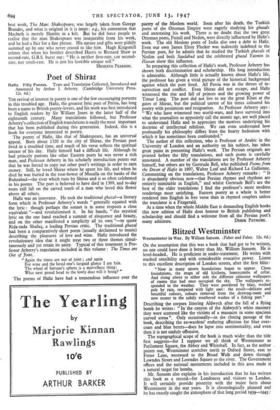Poet of Shiraz
THE revival of interest in poetry is one of the few encouraging portents in this troubled age. Hafiz, the greatest lyric poet of Persia, has long been a name to British poetry-lovers, and his work was first introduced to English readers by Sir William Jones in the latter half of the eighteenth century. Many translations followed, but Professor Arberry's collection of English translations is easily the most important that has been published during this generation. Indeed, this is a book for everyone interested in poetry.
The poetry of Hafiz, like that of Shakespeare, has an universal appeal. Born about 1320 in the city of Shiraz, the Persian poet lived in a troubled time, and much of his verse reflects the spiritual unease of his day. Hafiz himself had a difficult life. Although he had princely patrons like other Eastern poets he was never a rich man, and Professor Arberry in his scholarly introduction points out that he was forced to copy out other poet's writings in order to earn money. Still, he loved Shiraz where he spent his life, and when he died he was buried in the rose-bower of Musalla on the banks of the Ruknabad—the river which runs by Shiraz and is so often celebrated in his poems. The poet is believed to have died in 1389, and to-day 'roses still fall on the carved tomb of a man who loved this flower above all others.
Hafiz was an innovator. He took the traditional ghazal—a literary form which in Professor Arberry's words " generally equated with the lyric : though perhaps the sonnet is in some respects a close equivalent "—and revolutionised it. In his hands, " the mystical lyric on the one hand reached a summit of eloquence and beauty, and on the other manifested a simplicity all its own "—to quote Rida-zada Shafaq, a leading Persian critic. The traditional ghazal had been a comparatively short poem (usually declaimed to music) describing the pleasures of love and wine. Hafiz introduced the revolutionary idea that it might treat two or three themes simul- taneously and yet retain its unity. Typical of this treatment is Pro- fessor Arberry's translation included in this volume : The Times are Out of Joint.
" Again the times are out of joint ; snd again For wine and the loved one's languid glance I am fain.
The wheel of fortune's sphere is a marvellous thing: What next proud head to the lowly dust will it bring? "
The poems of Hafiz have had a tremendous influence over the
poetry of the Moslem world. Soon after his death, the Turkish poets of the Ottoman Empire were eagerly studying his ghazals and annotating his work. There is no doubt that the two great Ottoman poets, Fuzuli and Nedim, were directly influenced by Hafiz's work. The old Moslem poets of India also owe a debt to Hafiz. Even our own James Elroy Flecker was indirectly indebted to the Persian poet, for he admits that he studied the Turkish ghazals of Nedim and both Saadabad and the celebrated ghazal Yasmin in Hassan show this influence.
In preparing this collection of Hafiz's work, Professor Arberry has shown both discrimination and scholarship. His long introduction is admirable. Although little is actually known about Hafiz's life, the professor has given a vivid picture of the historical background against which the poet lived.. All Persia was in the throes of in- surrection and conflict. Even Shiraz did not escape, and Hafiz witnessed the rise and fall of princes and the growing power of Timur Lang. The poet did not live to see the great Khan at the gates of Shiraz, but the political unrest of his times coloured his poetry with pessimism and resignation. As Professor Arberry says : " We who have witnessed two world-wars, and have survived into what the journalists so appositely call the atomic age, are well placed to understand Hafiz and to appreciate the .motives underlying his doctrine of intellectual nihilism. We can even understand how profoundly his philosophy differs from the hearty hedonism with which it has sometimes been confounded."
The author of this collection, who is Professor of Arabic in the University of London and an authority on his subject, has taken great pains in presenting Hafiz's work. The Persian originals are printed before the fifty translations, and each poem is carefully annotated. A number of the translations are by Professor Arberry himself, but others are by Gertrude Bell, who published Poems from the Divan of Hafiz in 1897, Walter Leaf and Richard Le Gallienne. Commenting on the translations, Professor Arberry remarks : " It is abundantly obvious now—that Persian rhymes and rhythms are entirely inimitable in English," and whilst Gertrude Bell's are the best of the older translations I find the professor's more modern renderings most satisfying. Eastern poetry as a whole is better rendered into English in free verse than in rhymed couplets unless the translator is a Fitzgerald.
At a time when the whole Middle East is demanding English books this new edition of Hafiz does honour to British publishing and scholarship and should find a welcome from all the Persian poet's


































 Previous page
Previous page